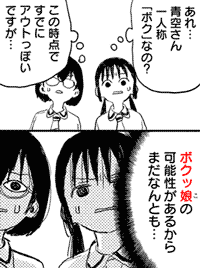ane 姉
In Japanese, ane 姉 means "older sister." It's somewhat synonymous with oneesan お姉さん, but differs in usage. (see ane vs. oneesan).
The "older brother" counterpart would be ani 兄, while imouto 妹 is "younger sister."
ani 兄
In Japanese, ani 兄 means "older brother.". It's somewhat synonymous with oniisan お兄さん, but differs in usage. (see ani vs. oniisan).
The "older sister" counterpart would be ane 姉, while otouto 弟 is "younger brother."
母, Haha - Meaning in Japanese
父, Chichi - Meaning in Japanese
姉貴, Aneki - Meaning in Japanese
兄貴, Aniki - Meaning in Japanese
ossan おっさん, Meaning in Japanese, Origin, Examples
In Japanese, ossan おっさん means "old man," or "middle-aged man." This isn't a polite word, so it's either used to refer to an old man in a cozy, friendly way, or in a rude, derogatory way. It's also spelled ossan オッサン, オッさん.
オヤジ, Oyaji - Meaning in Japanese - 親父, 親仁, 親爺
obaasan お祖母さん, お婆さん
In Japanese, obaasan おばあさん means "grandmother," and sometimes refers to an elder woman.
It's also romanized obāsan, with a macron. Not to be confused with obasan おばさん, without a macron, which means "aunt" instead.
ojiisan お祖父さん, お爺さん
In Japanese, ojiisan おじいさん means "grandfather," and sometimes refers to and elder man.
It's also romanized ojīsan, with a macron. Not to be confused with ojisan おじさん, without a macron, which means "uncle" instead.
obasan おばさん
In Japanese, obasan おばさん means "aunt," but sometimes it refers to an older woman.
Not to be confused with obaasan おばあさん, or obāsan with a macron, which means "grandmother" instead.
ojisan
In Japanese, ojisan おじさん means "uncle," but sometimes refers to an older man.
Not to be confused with ojiisan おじいさん, or ojīsan with a macron, which mean "grandfather" instead.
musume 娘
musuko 息子
In Japanese, musuko 息子 means one's "son" most of the time, except when it's used as an innuendo for one's "penis" instead.
imouto 妹
otouto 弟
oneesan
In Japanese, oneesan お姉さん means "older sister," and sometimes refers to a young girl. It's also romanized onēsan, with a macron for the long vowel.
The younger counterpart is imouto 妹, "young sister." The male counterparts are oniisan お兄さん and otouto 弟, "older brother" and "younger brother," respectively.
oniisan
In Japanese, oniisan お兄さん means "older brother," and sometimes refers to a young man. It's also romanized onīsan, with a macron for the long vowel.
The younger counterpart is otouto 弟, "young brother." The female counterparts are oneesan お姉さん and imouto 妹, "older sister" and "younger sister," respectively.
okaasan お母さん
The word okaasan お母さん means "mother" in Japanese (and sometimes refers to one's wife). It's one of the many family words with the o__san お〇〇さん pattern, and as such the honorific suffix can be changed between san, chan and sama.
otousan お父さん
Family Words
- Nuances, Usage & Differences
- San, Chan, Sama
- Chichi vs. Otousan
Haha vs. Okaasan
Ani vs. Oniisan
Ane vs. Oneesan - Mama, Papa
- Chichioya, Hahaoya
- Oyaji, Ofukuro
- Chichiue, Hahaue, Aniue, Aneue
- 父君, 母君
- 父御, 母御
- 尊父, 御親父
- ファーザー, マザー, シスター, ブラザー
- Aniki, Aneki
- 兄者, 姉者, 兄者人, 姉者人
- Obocchan, Ojousan
- Ooji, Ooba
- Jiji, Baba
- 外祖父, 内祖父, 外祖母, 内祖母, 外孫, 内孫
- 叔父, 伯父, 叔母, 伯母
- 従兄弟, 従姉妹, 従兄, 従弟, 従姉, 従妹
Tarou, Ichirou, Jirou, Saburou, Shirou
If you've watched a lot of anime, chances are you've come across a character or another with a name like this: Tarou 太郎, Ichirou 一郎, Jirou 次郎, Saburou 三郎, Shirou 四郎, or something else that ends in rou 郎. The question is: what's the meaning behind this naming pattern?
Well, it's a Japanese custom called haikoumei 輩行名, in which sons, only sons, male children, are named according to their birth order. An interesting thing of this practice is that you can tell whether a character has an older brother or not just from his name alone.
orekko オレっ娘
In Japanese, orekko オレっ娘 means a girl that uses ore 俺, a masculine first person pronoun.
It's also spelled orekko 俺っ娘, オレっ子, 俺っ子.
bokukko
In Japanese, bokukko ボクっ娘 means a girl that uses boku 僕, a masculine first person pronoun.
It's also spelled bokukko 僕っ娘, ボクっ子, or 僕っ子. Also called boku-shoujo ボク少女, or 僕少女, "boku girl."
~kko ~っ娘
In Japanese, ~kko ~っ娘 is a suffix attached to an attribute to refer to a type of girl that features that attribute, e.g. meganekko メガネっ娘 is a girl that wears "glasses," megane メガネ. For reference, this article will list some of such types of girls.
The suffix is also spelled ~kko ~っ子, ~kko ~っこ
